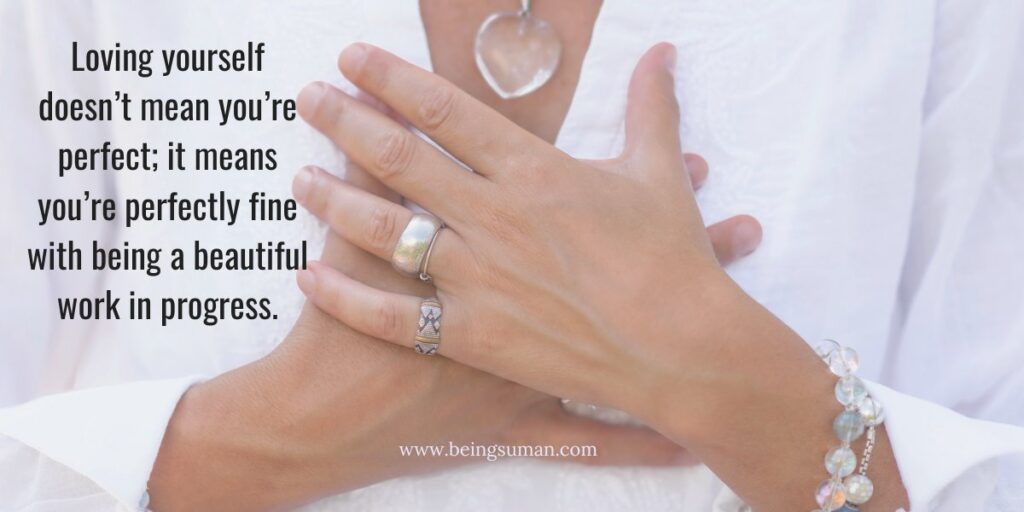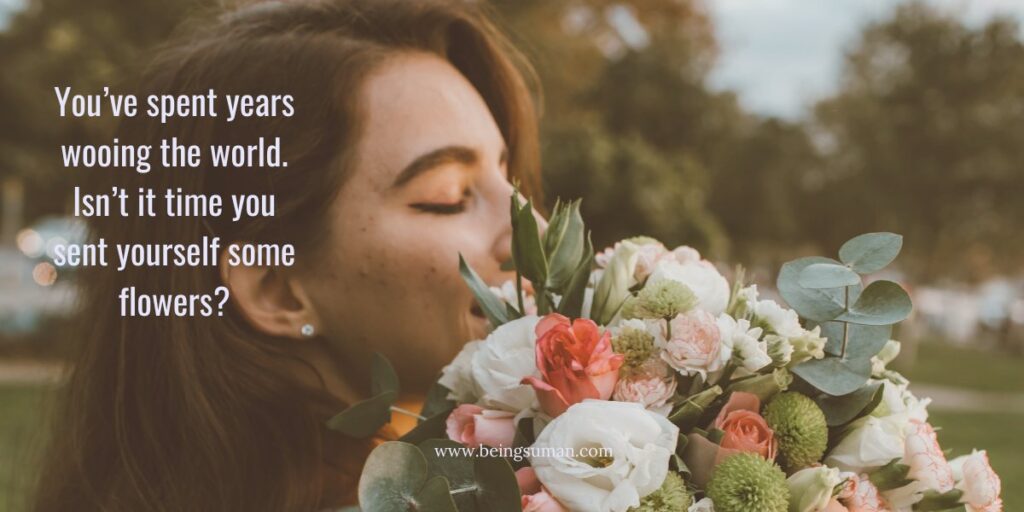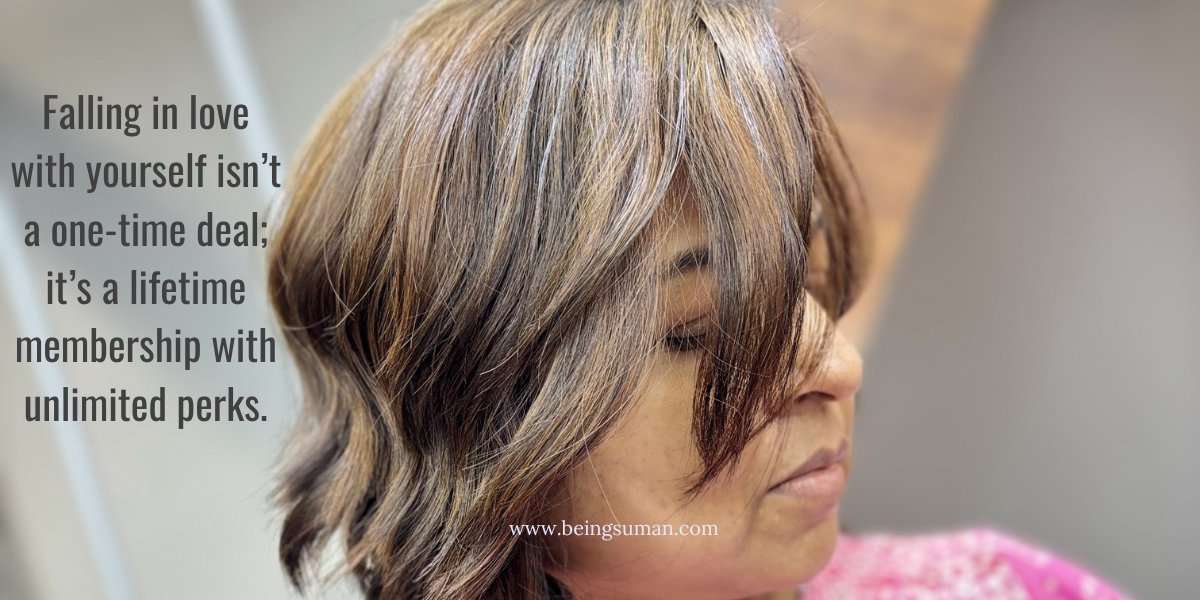I consider myself the biggest cheerleader of self-love. But let’s get one thing straight—self-love isn’t a fairytale with rose-tinted glasses and dreamy nonsense.
It’s about setting realistic expectations with yourself, treating your heart and mind with the gentleness they deserve, and taking steady, thoughtful steps toward your dreams.
If you can fall in love with so many people, places, and even your morning cup of tea, then why not try falling in love with yourself.- the one person who’s always there for you.
What Does It Really Mean to Fall in Love with Yourself?
For most of us, self-love sounds good on an instagram post with a pretty graphic that you share with a click.
Practicing self-love in daily life takes more than just double-tapping pretty quotes—it requires intentional effort. One great way to do this is through
journaling for self-discovery.
When it comes to the practice of self-love, it leaves with a lot of confusion.
We’re so used to showing up for everyone else that showing up for ourselves feels like a luxury—or worse, selfish.
Trust me when I say this, self-love is not a vanity project. There is nothing more nobler than falling in love with yourself. It’s the groundwork for mental peace and a life that feels like ours.
When we start seeing ourselves through a kinder lens, we’re not just better to ourselves—we’re better for the people we care about. A little patience with ourselves goes a long way. Imagine replacing all that guilt and self-criticism with compassion and maybe even a touch of humor.
Wouldn’t that make a world of difference in your life?
Self-love is good for your mental health.
The payoff for cultivating a
loving relationship with yourself is far better than wasting energy seeking validations outside.
When you make self love a habit and accept yourself, everything starts to feel lighter.
You feel better about who you are, you feel better about your relationships and your mind finally gets a breather.
The more we practice self-love, the easier it gets to be kind and gentle with ourselves—because we deserve nothing less. I found it is much easier use affirmations to begin this practise.

Building Self-Awareness
Most of the time we run on auto-pilot. We’re juggling so much that pausing to figure out why we’re feeling a certain way feels like an indulgence. And truth be told, we are raised to feel emotions are burdens. No wonder we tune ourselves out to all those indicators about our well-being that our mind, body, soul send us.
awareness begins when we tune in.
When take responsibility of how we feel against holding someone else responsible for how we feel.
When we take a moment to tune in—just a tiny moment—we start noticing things, our feelings, our thoughts.
Like how stress makes us snappy or how small wins actually brighten our day. This isn’t about psychoanalyzing ourselves; it’s about catching glimpses of what makes us tick.
And honestly, self-awareness isn’t about fixing ourselves.
It’s about getting curious. What if we approached our emotions and habits the way we’d approach a new recipe?
Trial and error, no pressure to get it perfect. Hey, lets be honest even when you perfect a recipe, we still tend to keep tweaking it here and there. So it is in personal growth. No yardstick, no one single recipe.

Self-Love and Self-Acceptance
Self-love and self-acceptance are like the roots and branches of the same tree—one can’t grow without the other.
When we accept who we are, just as we are, we create the foundation for growth and healing.
Accepting your body as it is, is self-love, even when we face challenges with our health.
We acknowledge the reality of the situation, and then we work toward a solution. For instance, living with a chronic condition like diabetes doesn’t mean we deny its existence.
Instead, we manage it with care, all while embracing the body that carries us through life.
The same applies to emotional struggles. If we’re prone to anxiety or self-doubt, self-love doesn’t demand that we erase these feelings overnight.
It means recognizing their presence, understanding where they come from, and taking small steps to cope and grow stronger.
Let’s take mistakes, for example. We’ve all made them—some big, some small.
Accepting them doesn’t mean excusing them, but rather learning from them without letting shame take the driver’s seat.
We acknowledge, we reflect, and we move forward.
Even our quirks and imperfections—the things we often think we need to “fix”—deserve our acceptance.
Maybe we’re not the most organized person, or perhaps we’re overly sensitive. These traits don’t make us any less worthy of love; they’re simply part of our unique makeup.
When we accept the full spectrum of who we are—the flaws, the challenges, the brilliance, and the mess—we pave the way for self-improvement. Acceptance doesn’t mean complacency; it means starting from a place of love rather than judgment. That’s when growth truly begins.

Cultivating Self-Compassion
Have you ever experienced something like this?
When your friend is having a rough day, spiralling in self-guilt because they’ve messed up, you’re quick to remind them it’s okay.
You say, “It happens to everyone,” or “Don’t be so hard on yourself.”
Now try flipping that mirror and saying it to yourself the next time you mess up.
Weird, isn’t it?
Why is it so much harder to extend the same kindness inward?
Maybe it’s because we’re taught to be our toughest critics, but here’s the truth: we deserve a break, too.
Practicing self-compassion isn’t indulgent—it’s necessary.
It’s about saying, “Hey, I’m doing the best I can with what I’ve got right now,” and meaning it. Maybe we mess up sometimes. Maybe we need a break.
Either way, we’re still worthy of kindness—especially from ourselves.
Here is how to develop self compassion.
- Practice loving-kindness meditation to cultivate self-love and self-acceptance.
- Use daily affirmations to rewire negative self-talk and promote self-compassion.
- Practice self-forgiveness and let go of past mistakes and regrets.

Embracing Self-Expression
When was the last time you did something just for the joy of it? Ok scrolling on social media does not count.
Pleasing anyone on the name of finding joy for yourself also doesn’t count.
Maybe it’s been a while.
Self-expression isn’t about being the best at something.
It’s about feeling more like ourselves. Whether it’s doodling, dancing in the kitchen, or journaling our wildest dreams, doing any activity that stumms your chord.
these moments remind us who we are beneath all the labels and roles we play.
Here is how to embrace self-expression –
Follow your passions:
Think about the things that light you up, whether it’s painting, cooking, gardening, or even just rearranging your bookshelf. Start small and see where it takes you.
Find joy in the little things:
Sometimes, self-expression is as simple as singing loudly to your favorite song or doodling while on a phone call. Joy doesn’t need an agenda.
Create meaning:
What feels purposeful to you? Maybe it’s volunteering, mentoring, or writing. Purpose adds a layer of richness to self-expression.
Show up as you are:
Be honest in your relationships, with no sugar-coating or playing small. The world needs our real selves, not a polished version.
Step out with confidence:
Chase that dream, apply for that role, or take that class. Even small steps toward our goals help us feel more like ourselves.

Developing a Positive Self-Esteem
The chemist is not selling self-esteem in a prescription bottle.
It’s more like a muscle we build over time. And just like working out, it’s less about big leaps and more about showing up consistently, even when we don’t feel like it.
We can’t hate ourselves into liking ourselves—it doesn’t work. What does help is noticing our wins (even the small ones), surrounding ourselves with people who cheer us on, and remembering that progress matters more than perfection. And it also helps to cheer for yourself even when no-one around is cheering for you.
Own your wins
You’ve accomplished so much in past decades—so give yourself credit where it’s due. Self-confidence begins with SELF.
Keep it real
Set goals that make sense for you. Forget what Instagram says; you’re not here for the hustle Olympics.
Small wins build big momentum, so start where you are and focus on sustainable success.
Be your biggest fan
Stop waiting for the world to approve of you. Accept yourself, flaws and all, because honestly, life’s way better when you’re on your own team. Nurture your self-esteem.
Choose yourself first
It is upto you to keep your amazing vibe alive.Practice self-love to develop a positive self-image..
Celebrate everything
Big wins, small wins, and everything in between—celebrate them all. Pop a metaphorical confetti cannon every time you hit a milestone. Why? Because progress deserves a party.

Letting Go of Negativity
This one’s a toughie. Letting go sounds great, but when negativity feels like a security blanket, it’s hard to put it down.
Maybe we’re hanging on to old regrets or comparing ourselves to someone who seems to have it all together. Please note the word – “seems”
What if we let ourselves off the hook, even just a little? Not in a “forget about it” way, but in a “I’m choosing to focus on today” way.
Releasing negativity isn’t about ignoring our struggles. It’s about not letting them run the show.
- When you see yourself comparing your life to someone else’s highlight reel, remind yourself that your journey is beautifully unique.
- When you catch yourself talking shit about yourself, flip the script and speak to yourself like you would to a dear friend.
- When you’re swimming in regrets, ask yourself if holding onto them is helping or hurting—and let them drift away like leaves on water.
- When guilt and shame start creeping in, remember that you’re human, not a robot—self-forgiveness isn’t optional, it’s essential.
- When your thoughts are stuck replaying the past or worrying about the future, take a deep breath and bring your focus back to now.
- When negativity starts renting space in your head, evict it with positive affirmations that remind you of your worth.Overcoming Obstacles to Self-Love
- Recognize the signs of lack of self-love, such as negative self-talk and self-sabotaging behaviors.
- Identify and challenge negative self-talk to rewire your mind with positive affirmations.
- Practice self-compassion and self-forgiveness to let go of guilt and shame.
- Develop a self-care routine that nourishes your mind, body, and soul.
- Surround yourself with positive and supportive people who uplift and encourage you.

Creating a Supportive Environment
They say we’re the average of the five people we spend the most time with. My reality is I spend most of my time with family. They are loving and supportive.
After that, I am watchful, where do I invest my energy.
Creating a supportive environment isn’t about cutting people off—it’s about setting boundaries that protect our peace.
Healthy relationships thrive on healthy boundaries.
And it’s about surrounding ourselves with things (and people) that remind us we’re doing okay, even on the hard days.
Maintaining Progress and Growth
Self-love isn’t a “set it and forget it” deal. It’s more like a garden—something we tend to regularly.
Some days we’re planting seeds. Other days we’re just pulling weeds and hoping for rain. Both are part of the process.
Success lies in sustained effort. Success lies in keeping track. And that is where journaling comes in handy.
Keep showing up.
Pat your back.
Learn from the setbacks.
And remember: it’s okay to take a break when we need to. Know that
progress isn’t linear, but it’s still progress.
Taking breaks also important to stay self-aware.
Self-awareness suffers when we are tired and it is easy to slip into sabotaging old patterns and habit.

Conclusion
Falling in love with ourselves isn’t about being perfect.
It’s about being real.
It’s about laughing at our quirks, forgiving our slip-ups, and showing up for ourselves the way we show up for others.
It’s being patient with yourself because falling in love with yourself does not happen overnight.
So, here’s to the messy, beautiful journey of self-love.
Let’s keep it simple, keep it kind, and most importantly, keep it ours.
That is why it is called self-love.


Your thoughts always inspiring and it’s always motivated me
Thank you so much Ratnesh 🙂